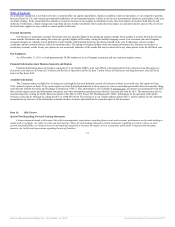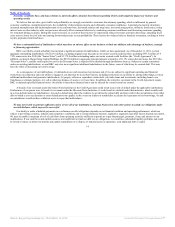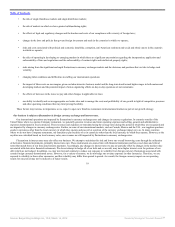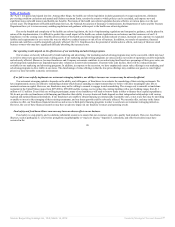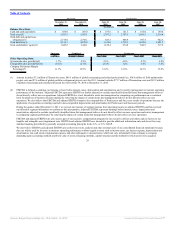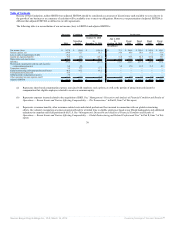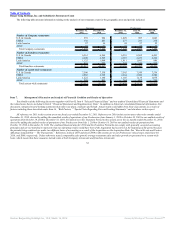Burger King 2011 Annual Report Download - page 23
Download and view the complete annual report
Please find page 23 of the 2011 Burger King annual report below. You can navigate through the pages in the report by either clicking on the pages listed below, or by using the keyword search tool below to find specific information within the annual report.
Table of Contents
The loss of key management personnel or our inability to attract and retain new qualified personnel could hurt our business and inhibit our ability to
operate and grow successfully.
We are dependent on the efforts and abilities of our senior management, and our success will also depend on our ability to attract and retain additional
qualified employees. Failure to attract personnel sufficiently qualified to execute our strategy, or to retain existing key personnel, could have a material adverse
effect on our business.
Changes in tax laws and unanticipated tax liabilities could adversely affect the taxes we pay and our profitability.
We are subject to income and other taxes in the United States and numerous foreign jurisdictions. Our effective income tax rate in the future could be
adversely affected by a number of factors, including: changes in the mix of earnings in countries with different statutory tax rates; changes in the valuation of
deferred tax assets and liabilities; continued losses in certain international Company restaurant markets that could trigger a valuation allowance; changes in tax
laws; the outcome of income tax audits in various jurisdictions around the world; taxes imposed upon sales of Company restaurants to franchisees; and any
repatriation of non-U.S. earnings for which we have not previously provided for U.S. taxes.
Although we believe our tax estimates are reasonable, the final determination of tax audits and any related litigation could be materially different from our
historical income tax provisions and accruals. The results of a tax audit or related litigation could have a material effect on our income tax provision, net income
(loss) or cash flows in the period or periods for which that determination is made.
In addition, as a result of our recent issuance of high yield notes and our new credit facility, our effective tax rate and our ability to utilize our foreign tax
credits may be adversely impacted.
Leasing and ownership of a significant portfolio of real estate exposes us and our franchisees to possible liabilities and losses.
Many of our Company and franchised restaurants are presently located on leased premises. As leases underlying our Company and franchised restaurants
expire, we or our franchisees may be unable to negotiate a new lease or lease extension, either on commercially acceptable terms or at all, which could cause us
or our franchisees to close restaurants in desirable locations. As a result, our sales and our brand building initiatives could be adversely affected. We generally
cannot cancel these leases; therefore, if an existing or future restaurant is not profitable, and we decide to close it, we may nonetheless be committed to perform
our obligations under the applicable lease including, among other things, paying the base rent for the balance of the lease term.
We may not be able to adequately protect our intellectual property, which could harm the value of our brand and branded products and adversely affect
our business.
We depend in large part on our brand, which represents 40% of the total assets on our balance sheet as of December 31, 2011, and we believe that our
brand is very important to our success and our competitive position. We rely on a combination of trademarks, copyrights, service marks, trade secrets, patents
and other intellectual property rights to protect our brand and branded products. The success of our business depends on our continued ability to use our existing
trademarks and service marks in order to increase brand awareness and further develop our branded products in both domestic and international markets. We
have registered certain trademarks and have other trademark registrations pending in the United States and foreign jurisdictions. Not all of the trademarks that we
currently use have been registered in all of the countries in which we do business, and they may never be registered in all of these countries. We may not be able
to adequately protect our trademarks, and our use of these trademarks may result in liability for trademark infringement, trademark dilution or unfair competition.
The steps we have taken to protect our intellectual property in the United States and in foreign countries may not be adequate and our proprietary rights could be
challenged, circumvented, infringed or invalidated. In addition, the laws of some foreign countries do not protect intellectual property rights to the same extent as
the laws of the United States.
22
Source: Burger King Holdings Inc, 10-K, March 14, 2012 Powered by Morningstar® Document Research℠


